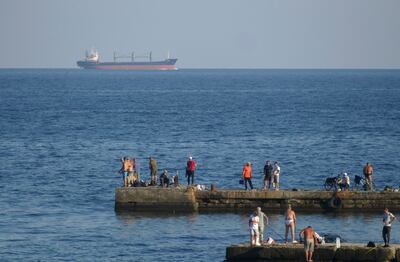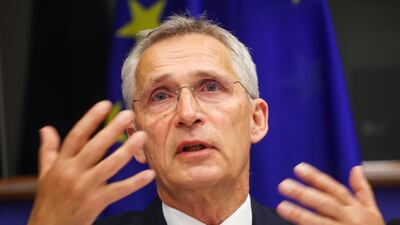The head of Nato has warned there will be no quick conclusion to the war in Ukraine, as Kyiv's counter-offensive against Russia continues.
Secretary General Jens Stoltenberg told Germany's Funke media group “most wars last longer than expected when they first begin” and because of that “we must prepare ourselves for a long war in Ukraine”.
Ukraine's counter-offensive, which President Volodymyr Zelenskyy announced in June, has made some gains in pushing back Russian positions in the country's south and east.
“We are all wishing for quick peace,” Mr Stoltenberg said.
“But at the same time we must recognise if President Zelenskyy and the Ukrainians stop fighting, their country will no longer exist.”
He added that should Russia lay down its weapons, “we will have peace”.
Mr Stoltenberg said there was “no doubt that Ukraine will eventually be in Nato”.
“When this war ends, we need security guarantees for Ukraine. Otherwise, history could repeat itself,” he said.
Call for arms
Mr Zelenskyy is due to visit US President Joe Biden at the White House in Washington this week, where he is expected to renew his request for the supply of Army Tactical Missile Systems (ATACMS).
While more arms are expected to be announced for Ukraine during his visit, ATACMS are not on the list, although four US senators are urging Mr Biden to include them.
“Ukraine has significantly degraded Russian combat power and only requires a small portion of our stockpiled ATACMS,” senators Tom Cotton, Roger Wicker, Susan Collins and Lindsey Graham wrote in a letter on Saturday.
Canada's Defence Minister Bill Blair on Sunday said his country would contribute $24.5 million to a British-led partnership that is buying air defence equipment for Ukraine.
Mr Blair said the contribution would form part of the $370 million military aid package announced by Prime Minister Justin Trudeau in June.
The Russian Defence Ministry on Sunday said it had carried out a missile strike on a plant in the north-east Ukrainian city of Kharkiv, where it claimed armoured vehicles for Ukraine's military were being repaired.
Kharkiv regional governor Oleh Synehubov wrote on the Telegram messaging app that Russia had hit the building of a “civilian enterprise” in the city with four S300 missiles.
Parts of Kharkiv are fewer than 35km from the Russian border and experienced heavy fighting early in the conflict.

Going against the grain
On Sunday, Russia launched a combined drone and missile attack on southern parts of the Odesa region, hitting an agricultural plant, Ukraine's Air Forces wrote on the Telegram app.
Russia launched six Iranian-made Shahed drones and 10 cruise missiles but Ukrainian forces were able to destroy all the drones and six missiles before they hit their targets, the message said.
Ukraine on Saturday said two cargo vessels were sailing towards the port of Chornomorsk on the Black Sea to transport exported grain to African and Asian markets through a temporary sea corridor.
Ukraine revealed the opening of the corridor last month to circumvent a de facto blockade after Russia abandoned a deal to let Kyiv export grain.
Last week, the EU ended a ban on Ukrainian crop imports in five of its eastern countries but that merely prompted Poland, Hungary and Slovakia to announce their own restrictions, which technically would break the rules of the bloc's single market.
Russia remains in a commanding position within the global wheat export market after another significant harvest.


